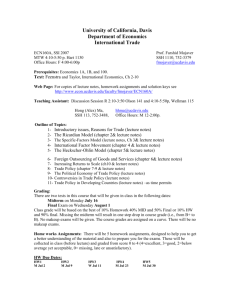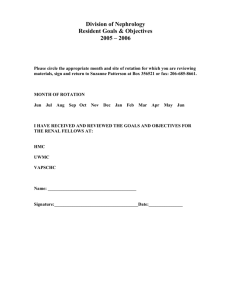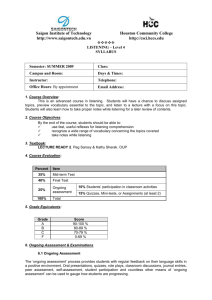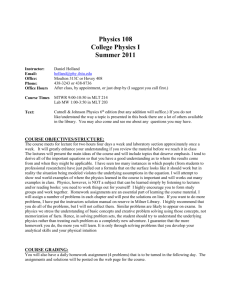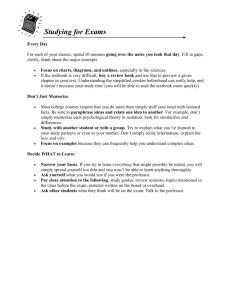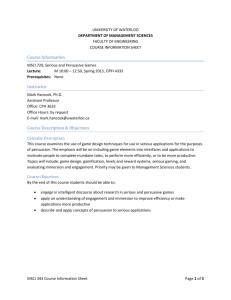GE 2820 – Engineering Economy – Summer 2012
advertisement
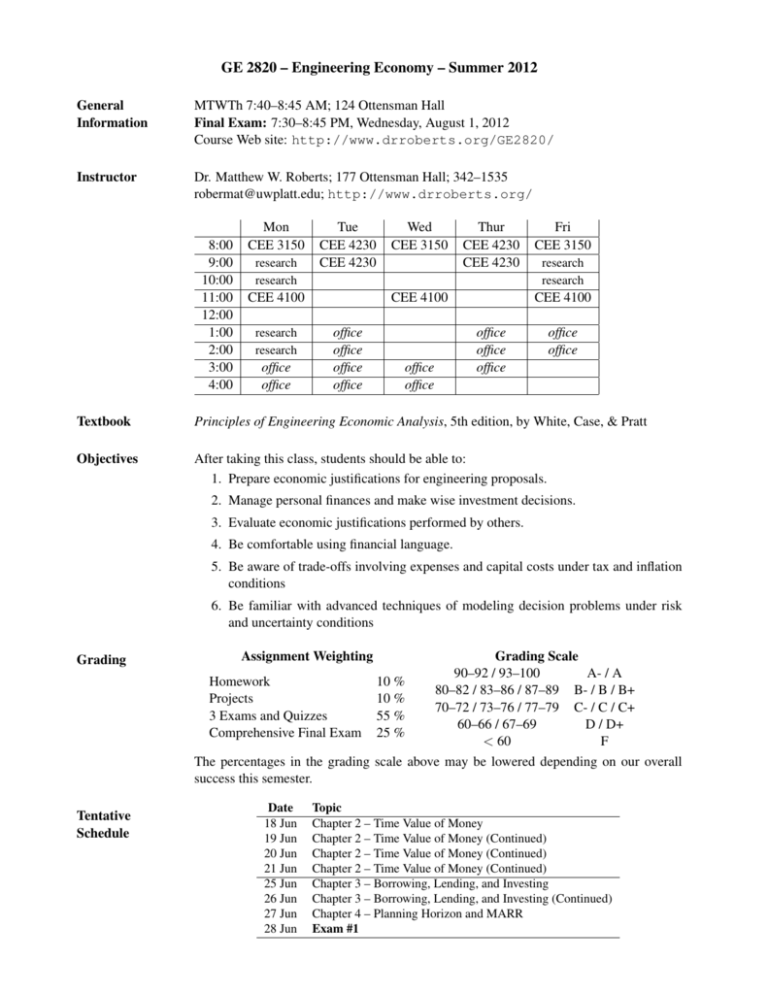
GE 2820 – Engineering Economy – Summer 2012 General Information MTWTh 7:40–8:45 AM; 124 Ottensman Hall Final Exam: 7:30–8:45 PM, Wednesday, August 1, 2012 Course Web site: http://www.drroberts.org/GE2820/ Instructor Dr. Matthew W. Roberts; 177 Ottensman Hall; 342–1535 robermat@uwplatt.edu; http://www.drroberts.org/ 8:00 9:00 10:00 11:00 12:00 1:00 2:00 3:00 4:00 Mon CEE 3150 research research Tue CEE 4230 CEE 4230 CEE 4100 research research office office Wed CEE 3150 Thur CEE 4230 CEE 4230 CEE 4100 office office office office office office Fri CEE 3150 research research CEE 4100 office office office office office Textbook Principles of Engineering Economic Analysis, 5th edition, by White, Case, & Pratt Objectives After taking this class, students should be able to: 1. Prepare economic justifications for engineering proposals. 2. Manage personal finances and make wise investment decisions. 3. Evaluate economic justifications performed by others. 4. Be comfortable using financial language. 5. Be aware of trade-offs involving expenses and capital costs under tax and inflation conditions 6. Be familiar with advanced techniques of modeling decision problems under risk and uncertainty conditions Grading Tentative Schedule Assignment Weighting Grading Scale 90–92 / 93–100 A- / A Homework 10 % 80–82 / 83–86 / 87–89 B- / B / B+ Projects 10 % 70–72 / 73–76 / 77–79 C- / C / C+ 3 Exams and Quizzes 55 % 60–66 / 67–69 D / D+ Comprehensive Final Exam 25 % < 60 F The percentages in the grading scale above may be lowered depending on our overall success this semester. Date 18 Jun 19 Jun 20 Jun 21 Jun 25 Jun 26 Jun 27 Jun 28 Jun Topic Chapter 2 – Time Value of Money Chapter 2 – Time Value of Money (Continued) Chapter 2 – Time Value of Money (Continued) Chapter 2 – Time Value of Money (Continued) Chapter 3 – Borrowing, Lending, and Investing Chapter 3 – Borrowing, Lending, and Investing (Continued) Chapter 4 – Planning Horizon and MARR Exam #1 2 Jul 3 Jul 4 Jul 5 Jul 9 Jul 10 Jul 11 Jul 12 Jul 16 Jul 17 Jul 18 Jul 19 Jul 23 Jul 24 Jul 25 Jul 26 Jul Notes Chapter 5 – Present Worth Analysis Chapter 6 - Future Worth Fourth of July – No Class Chapter 7 - Annual Worth Chapter 8 – Rate of Return Analysis Chapter 9 – Depreciation Methods Chapter 9 – Depreciation Methods (Continued) Exam #2 Chapter 10 – After-Tax Economic Analysis Chapter 10 – After-Tax Economic Analysis (Continued) Chapter 14 – Economic Analysis in the Public Sector Chapter 11 – Replacement Analysis Chapter 11 – Replacement Analysis (Continued) Chapter 12 – Inflation Effects Chapter 13 – Break-Even Analysis Exam #3 1. Exams must be taken as scheduled. Any absence not excused in advance will result in a zero for that exam. Examinations will be closed-book and closed-notes. You will be given a summary sheet to use on the exam that will include important equations. Depending on the coverage of the exam, code books may be allowed—I will let you know. If you feel an answer on an exam is unreasonable but cannot see the error (or do not have time to correct it) indicate your concern with an explanation of why the answer does not seem right. 2. Homework will not be accepted after the grader has picked up the assignment. There is usually not a set time when the grader will pick up the homework, so your best bet is to turn in the assignment during class. Please do not turn in homework once the lecture has started—wait until after class. Proper (full-participation) use of study groups for homework is encouraged (and may be required on some assignments). Improper (copying other people’s work) use of study groups is a violation of engineering ethics. If you experience difficulty, don’t waste time trying again and again. Instead, come to me for help with your basic approach. Of course, do not leave your homework until the last day. 3. Cheating of any sort will not be tolerated. As an engineer, your signature means that you have done the calculations and stand behind the results. If you collaborate with other students when completing homework assignments (highly encouraged) then note the names of those you worked with on the front of your homework. 4. Desire2Learn will be used to record your scores from homework, projects, and exams. http://d2l.uwplatt.edu/ 5. If you need an accommodation due to a disability, please make an appointment to see me during office hours. A VISA from Services for Students with Disabilities authorizing your accommodations will be needed. For more information, see http://www.uwplatt. edu/disability/. 6. Please phone for help on assignments only as a last resort. It is very difficult to understand your problem without seeing your work. Providing help by e-mail is also difficult. The easiest way for me to provide assistance is to see your work first-hand during office hours. If you cannot make office hours, please email or call to make an appointment so I can be sure to be in my office when you stop by. Getting help on homework works best when you start your assignments early and do not leave matters until the last minute. 7. All class correspondence sent by me will be to your UWP e-mail address. I do not have access to non-UWP account addresses. You are responsible for periodically checking your UWP account or having the mail from your UWP account forwarded to the e-mail address of your preference. 8. Seek help from me when you first encounter difficulty. Don’t wait until you are behind to seek help. I am eager to help you in your desire to master the material of this course. 9. Religious accommodations will be granted for students who wish to observe religious events. You are responsible for letting me know within the first two weeks of class any accommodations you require. You will still be responsible for the assigned work, but you will be allowed a due date that does not conflict with your religious needs 10. Veterans and reserve duty military personnel with special circumstances are welcome and encouraged to communicate these in advance (if possible) to me. I am happy to work with you to ensure that your service will not conflict with your academic goals. Expectations on Homework and Exams Read the Directions - Many mistakes on homework and exams are made because students fail to read the instructions. This can be particularly detrimental on exams if unnecessary work is performed that wastes valuable time. Work Symbolically - It is often preferable to develop solutions in terms of symbols. Reduce developed formulas as much as possible. Unless otherwise required, a numeric answer is acceptable on homework or exams. Draw Diagrams - Diagrams should be drawn well (particularly on the homework) and should be reasonably close to scale. Solve the Problem Clearly - Your solutions on homework and exams should flow logically and should be easy to follow. Indicate the basis for any new equations. Number all equations that are referred to by subsequent statements. Ask yourself, “Would I be happy to pay for the quality of work that I am producing?” On exams, make sure that any extra sheets you use are attached in order so that the exam can be graded without need to skip pages or turn to previous pages. Clearly Mark your Answers - Answers should be easy to find and interpret. If you have multiple answers they must be summarized in a “results table” at the end of the problem. Produce Excellent Shear and Moment Diagrams - Shear and moment diagrams are critical for designing structures. Your shear and moment diagrams should be drawn reasonably close to scale. The minimum, maximum and zero values should be labeled and the location of each noted. On exams, it is particularly important that your shear and moment diagrams be consistent with the loads and reactions. The first derivative of the moment is the shear and this should be evident on the diagrams. Shear and moment diagrams that are wrong will be marked down further if they are inconsistent. Use Units - All your calculations should include units and the units on the final answer should be correct. Up to 5 points can be deducted on exams for consistently neglecting units or for incorrect units. Do not proceed with an answer if the units are obviously inconsistent. Ask yourself: Is this answer reasonable? - If your answer does not seem reasonable and you don’t have time to find your error (for example, on an exam), explain that the answer is not reasonable as well as a short explanation why you feel that way. Unreasonable answers that are not commented upon will lose points on exams. Simultaneous Equations on Exams - You should be able to solve three simultaneous equations on exams.
